|
|
|
Sort Order |
|
|
|
Items / Page
|
|
|
|
|
|
|
| Srl | Item |
| 1 |
ID:
110089
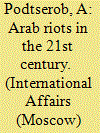

|
|
|
|
|
| Publication |
2011.
|
| Summary/Abstract |
THE WAVE OF POPULAR RIOTS which swept the Middle East and North Africa and which remains the key factor behind the regional developments engulfed not only the poor countries but also those which coped both socially and economically.
Between 2004 and 2009, for example, Tunisia increased per capita income from 3.5 thousand Tunisian dinars ($2.7 thousand) to 5 thousand TND ($3.9 thousand); its middle class (60% of population) accounted for 83% of total consumption; 80% were house owners; 21% had cars. In oil-rich Libya the year 2011 began very much as usual: foodstuffs and money were distributed among the poor; some families received free car coupons practically on the eve of the uprising.1
|
|
|
|
|
|
|
|
|
|
|
|
|
|
|
|
| 2 |
ID:
175971
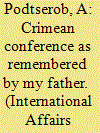

|
|
|
|
|
| Summary/Abstract |
MY FATHER, Boris Fyodorovich Podtserob, was the senior assistant of the People's Commissariat of Foreign Affairs of the Soviet Union during the war. This position allowed him to attend a number of historic diplomatic talks. That is how he came to participate in the Yalta Conference. My father did not leave written memoirs, but he used to tell me about the fateful meeting among three of the world's giants.
|
|
|
|
|
|
|
|
|
|
|
|
|
|
|
|
| 3 |
ID:
127476
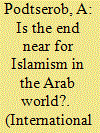

|
|
|
|
|
| Publication |
2013.
|
| Summary/Abstract |
THE SITUATION in the Middle East is complicated. In some countries Islamists are suffering a defeat while in other states they are putting up resistance.
The situation is naturally affected by the ongoing developments in Egypt. President Mohammed Morsi was elected in June 2012 with 52% of Egyptians voting for him. It is noteworthy that semi-literate and illiterate masses voted for the Muslim Brotherhood's candidate while the elite voted against him. The newly elected president took the path of turning Egypt into an "Islamic republic." Five representatives of the Muslim Brotherhood received ministerial portfolios, eight were appointed to positions in the presidential administration, 25 were appointed as governors' aides, and 12 representatives were nominated for mayors. M. Morsi made an attempt to establish control over the legislative, executive and judicial branches of government, as well as over the media. In November 2012, he ruled that courts may not challenge presidential decrees. On his watch, in 2012, a new Egyptian constitution was adopted that, in particular, limited women's rights and also proclaimed that the leadership of A1 Azhar University, which significantly influences political processes in the Arab world, is "the supreme and only arbiter on issues of Sharia law" and "the main source of the legal framework.
|
|
|
|
|
|
|
|
|
|
|
|
|
|
|
|
| 4 |
ID:
156336
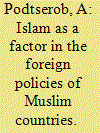

|
|
|
|
|
| Summary/Abstract |
THERE IS A RANGE OF FACTORS behind the foreign policies of Islamic countries, which include their geopolitical status, their international political and economic relations, their ideologies, and the interests of their ruling classes. Islam is one of these factors. Remarkably, while we don't use the phrase "European Christian civilization" to describe Europe, a relatively small continent, we do use the phrase "Arab-Muslim civilization" in reference to Muslim countries with the implication that Islam is a factor in their foreign as well as their home policies.
|
|
|
|
|
|
|
|
|
|
|
|
|
|
|
|
| 5 |
ID:
151597
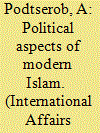

|
|
|
|
|
| Summary/Abstract |
UNTIL THE EARLY 1960S, modern political Islam did not have much influence in the Arab world or in the Middle East. There was an ongoing conflict in the region between nationalists, who were supported by the Soviet Union, and conservative regimes, which were supported by the West. Over time, radical movements managed to build a political consensus to strengthen their influence. However, the gradual escalation of insoluble problems triggered the onset of the destruction of political nationalism. In addition, radical public trends outwardly emulated European radicalism.
|
|
|
|
|
|
|
|
|
|
|
|
|
|
|
|
| 6 |
ID:
184021
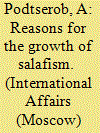

|
|
|
|
|
| Summary/Abstract |
RECENTLY, the Islamic world has seen the growth of fundamentalism - an extreme form of Islamism that rejects democracy as such and uproots it wherever it sprouts. Some Salafist organizations are limited and local, some rely on outside support, while others are broad in scope and span the entire Muslim world. Analysis of the activities of Islamist organizations is complicated by the fact that unrelated groups often operate within their framework. Salafis number about 50 million worldwide and are active in 80 countries. However, it should be noted that Salafi jihadists number no more than 10 million, which is just 1% of the world's Muslims.
|
|
|
|
|
|
|
|
|
|
|
|
|
|
|
|
|
|
|
|
|